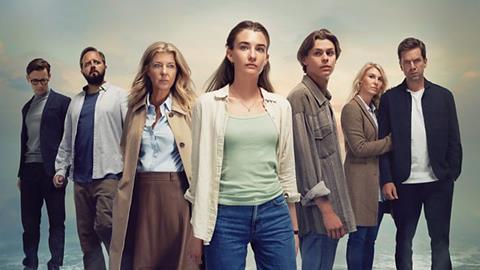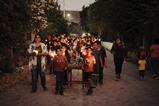Katrina Robinson explores themes of faith, redemption, and the enduring power of human connection in the Danish drama Families Like Ours.

‘This is just like a modern-day version of Ruth and Naomi!’ I found myself exclaiming to my husband as we sat on the sofa and watched Families Like Ours (original Danish: Familier som vores), currently streaming free on BBC-iPlayer.
This seven-part fictional Danish drama about a blended family and their circle trying to navigate a national emergency is not only a gripping thriller but resonates with Christian ‘Kingdom values’.
Set in the not-too-distant-future, Families Like Ours takes place in a Denmark which is being evacuated and closed down due to rising sea-levels that will soon flood the entire country. We witness nineteen-year-old Laura’s dilemma as she is emotionally and morally torn between which one of her divorced parents she should accompany in the national relocation programme.
READ MORE: ‘Do not suffer alone’
Should she go with her self-funded architect father and his second wife and toddler to a potentially comfortable new life in Paris? Or be part of the state-sponsored scheme with her considerably less well-off, mentally fragile, and completely alone mother, to much less affluent Romania? A third complication for Laura is that she is in love with fellow-student Elias, whose family ties mean he may end up in Finland.
Sounds bleak?
While its subject matter and tone is serious, Families Like Ours delivers a sense of hope
Actually, no. While its subject matter and tone is serious, Families Like Ours delivers a sense of hope through the actions people take and moral choices they have to consider, probably for the first time in their lives. We witness some characters becoming humbler and more authentic as a result of going through loss and disappointment. We see moments of mercy and self-sacrifice.
At its heart is a grownup truth: we are free moral agents making choices about our actions which ultimately determine who we are. One character loses self-control for a moment with consequences he could not have foreseen. He experiences terrible remorse, makes efforts to make restitution to those hurt, but what he has done will remain with him.
Even the episode titles have a biblical flavour: ‘The Hour Draws Near’ (John 16:32), ‘Separating the Wheat from the Chaff’ (Matthew 3:12), ‘The Angels Watch’ (Psalm 91:11), and ‘A Time to Get and a Time to Lose’ (Ecclesiastes 3:6).
READ MORE: New HBO Harry Potter series means a fresh generation of Christians are divided once again
And my jaw dropped when in one episode I saw that ultimate TV-taboo. Not sex. Not drug-taking. Not death. Someone. Actually. Praying. Out loud. On screen.
In one of the most unexpectedly moving TV scenes I’ve seen
In one of the most unexpectedly moving TV scenes I’ve seen, a character who has become a churchgoer prays aloud together with another passenger (who doesn’t believe in God but is happy to join in) as their evacuation ship leaves Denmark for the last time. She asks God to help them not to be afraid to believe what they cannot fathom. Nor to be afraid to love what they cannot explain. Nor to be ‘petrified by pure reason’. In effect it’s saying the materialist view of the world can never hold all the answers. She concludes by praying for faith, hope, and love, as she and her cabin-mate and thousands like them face an unknown future.
READ MORE: TV show ‘Long Lost Family: Born Without Trace’ on God rescuing an abandoned baby
I was interested to learn recently that the series’ director, Thomas Vinterberg, is married to Helene Reingaard Neumann, an ordained minister in the Danish Lutheran Church and who plays Laura’s stepmother in the drama.
How joyous then that the final episode is called, ‘I Make All Things New’, echoing Jesus’s words in Revelation 21:5.
You’ll have to watch it for yourself to find out the new beginnings that become possible after what feels to the characters of Families Like Ours as though it might be the end of everything.


































No comments yet